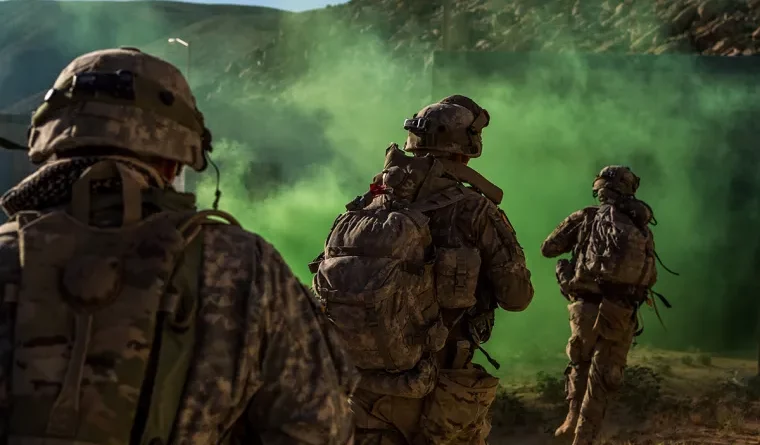What is a Forceful Military Attack in 2022?
What is the correct word for a forceful military attack? There are several options ranging from a verbal assault to an actual military attack. If you don’t know what to call a military attack, then you can use the thesaurus below. Thesaurus definitions are often free of charge, and the pronunciation is given, too.
It is not always easy to define an “armed attack.” In general, forceful military measures must be multilaterally authorized and require the approval of the Security Council. The UN Charter gives the Security Council broad discretion. As the only body with a legal right to authorize use of force against a sovereign state, the Security Council’s authorization of such a measure should be sought whenever possible.
What is a forceful military attack called?
Table of Contents
A military attack is a deliberate use of force against another country. An attack may be a one-off episode, or it can be a campaign that continues throughout its duration. For example, the Iraqi invasion of Kuwait in 1990 was a campaign that continued for nearly a year. The attack continued until Kuwait used its right of self-defence to end it.
The definition of an armed attack is rather difficult. However, the UN Charter gives the Security Council broad discretion when it comes to authorizing a military attack. Moreover, a state considering the use of force must seek multilateral authorization before employing it. This is the only body with a clear legal right to authorize forceful measures against a sovereign state.
What is another word for a military attack?
A forceful military attack is an attack conducted with the intent of harming another person or object. This action can take place in several ways. For example, an attack could take place if bees attack a person and they are unable to escape. Another example of a forceful attack would be when a group of soldiers launches missiles against a specific state. These attacks can be viewed as a form of terrorism.
The United Nations has wide discretion when it comes to authorizing force. Under international law, a state must seek multilateral authorization before engaging in any attack on another state. However, armed attacks can occur in situations where there is no international law to guide the action. The UN Security Council has the legal right to authorize any military action against a sovereign state.
The use of force should follow international humanitarian law. However, some definitions are not clear. A forceful attack may include a military action authorized by the Security Council or a self-defense response. In addition, it could be a pre-emptive act, such as the mass movement of tanks and nuclear missiles. It could also involve an act of self-defence, such as rescuing nationals who are in another country.
What is a forceful and bitter verbal attack?
If you’re looking for a crossword puzzle answer to the clue What is forceful and bitter verbal attack?, you’ve come to the right place. The crossword solver provides solutions for classic and cryptic crossword puzzles. The solution to the clue “Forceful and bitter verbal military attack” is ‘forceful’. The definition of forceful is “a forceful and bitter attack against someone or something.”
What is a word for a sudden army attack?
A sudden army attack, sometimes referred to as a sortie, is a force that attacks an enemy in a decisive battle. These forces may not be under siege. They may also have a choice of surrendering at the discretion of the commander. The army consists of divisions and companies. Each company has between 50 and 100 men. A division is comprised of two to five brigades. A corps is composed of two or more divisions.
What is a military raid called?
A military raid is an operation in which an army or force enters a territory and strike the enemy while it is unprepared. The purpose is to capture territory, free prisoners, or destroy enemy installations. This type of operation is highly secretive, and its primary goal is to achieve maximum results with the least possible casualties. A military raid can be anything from a simple patrol to a more complex mission, but it has a common denominator: speed. The objective of the raid is to destroy enemy installations, capture prisoners, or collect intelligence. In most cases, the mission is accomplished with minimal casualties, but in some cases, the target may be completely destroyed.
A military raid is usually conducted by a single unit, with specific objectives set by the commander. This unit is oriented toward these objectives and will then make a withdrawal along a different route or axis after completing its objective.
What is a military raid or attack?
A military raid or attack is a secretive and fast-paced operation to disrupt enemy forces and accomplish a specific mission. It is designed to achieve this objective with the least amount of casualties possible. In its original meaning, the word “raid” means to attack suddenly or unexpectedly. Raids can be of any type, although their common denominator is speed. Raids are designed to disrupt enemy command and control nodes and disrupt the enemy’s plans.
In most cases, the objectives of a military raid are very specific. These objectives help orient the raiding unit and its objectives. Once the mission has been completed, the attacking force will retreat along a different route or axis. It is important to note that the term “raid” is also used to refer to attacks on civilians.
The military uses various types of attacks, each of which serves different purposes. The first type, search and attack, is normally carried out by light forces. A second type, spoiling attack, is typically carried out by a company team. In addition, a counterattack is also a type of attack.
What is a sudden army attack called?
A sudden army attack is a sudden attack on a besieged army. It is often preceded by surrender at the discretion of the attacking army. There are two basic types of sudden army attacks: a sacking and a sortie. Both are intended to eliminate the enemy and end the war. A sacking is more serious than a debellatio, which is the complete destruction of an enemy state. It often shifts the course of a conflict.
In an attack, the enemy will attempt to prevent the attackers from reaching their objectives. There are a number of ways to carry out a sudden army attack. One method is to encircle an enemy’s supply lines. Another method of encirclement is a blockade. This involves the use of naval vessels to prevent movement of goods across enemy lines. A breakout, on the other hand, involves exploiting a breach in the enemy’s defenses. Other techniques include the bridgehead and the airhead.
Forceful Military Attack Crossword Clue
Forceful military attack is a crossword puzzle clue that’s easy to solve. With more than a Million possible matches, you can find the solution in one click. It’s never been easier to find a solution to a puzzle! Forceful military attack crossword clue: Related clues
“Forceful military attack” was last seen in the New York Times crossword on June 29, 2018. This clue is from the classic crossword “Clue”. To solve it, visit the Crossword Solver. It’s a great tool for finding answers to cryptic and classic crossword puzzles alike. The tool also has an option to sort crossword answers by word length.
Need for non-military means
The law of self-defence recognizes that a territorial state has the right to use force to end an attack in self-defence. However, this is only an option where peaceful means have failed or are ineffective. It is therefore essential to consider the imminence and means available to the state under attack before resorting to force.
The use of nonmilitary means is essential for the success of strategic deterrence, a strategy based on convincing an opponent of the credible threat of using military force. However, in the absence of any crisis management mechanisms, such nonmilitary means may be misunderstood.
The legality of the war has faced criticism since the attacks of 11 September 2001. Critics of the law of war to contend that the attacks do not meet the legal definition of an armed attack. To qualify as an armed attack, a State must use the force in a manner analogous to a large-scale attack across national borders.
Moreover, it is essential to have an intention to use force. In the Oil Platforms Case, the ICJ cited this requirement when it asked whether the US could prove that Iran had an explicit intent to attack the US and destroy its vessels. However, the requirement for specific intention to use force may be more difficult to meet.
Imminence
The imminence of a forceful military attack is a critical criterion that must be met to justify military force in self-defence. The attack must be imminent or continuous, and peaceful means of ending it must have failed or are unavailable. In addition, it must be likely that the non-military option will be ineffective. This threshold is referred to as the criterion of necessity.
The imminence of an attack can be measured by considering the gravity of the attack, the capability of the attacker, and the nature of the threat. As such, it is important to remember that force may only be used when it is properly justified and after a good faith assessment of the facts. However, the Caroline concept of imminence reflects the Caroline formulation and is defined as a moment of overwhelming threat, leaving no alternative but to use force. Furthermore, it is important to note that the concept of imminence cannot be restricted to attacks by terrorist organizations. It must also include state-directed attacks.
In assessing the imminence of an attack, the state should consider the capability of the attacker as well as their intention to attack. Without an intent to attack, a capability of an attacker cannot make an attack imminent. For example, both the United States and Russia have the capability to destroy one another within hours, but that does not make an attack imminent.
Legality
The legality of forceful military attack is a subject of debate. There are two main issues to consider: whether a military action can be justified and when it is legitimate. An armed attack on the territory of a victim state is legal; an attack on the territory of a non-attacking state is not.
The definition of “armed attack” varies by country. In general, the United States equates an armed attack with the use of force. Most other states define it as a “gravest form” of force. In cases where the use of force is justified, the ICJ has a relatively liberal interpretation of what constitutes an armed attack.
However, an armed attack requires that the attacker have a specific intention to attack the target. For example, in the Oil Platforms Case, the ICJ asked whether the US was able to demonstrate that Iran was acting specifically against US vessels and had an intent to do so. If the US could not prove specific intent to harm a vessel, then it could not justify an attack.
The use of force must be based on a legal basis that is acceptable to the public and to the vast majority of the international community. During an international armed conflict, a military action must be justified by a compelling case. By contrast, an armed attack by a nation should only be justified if it defends itself from an armed attack.
Justification
When a country feels that the only viable way to protect its people is to use military force, it may be justified to do so. The state may be unable to convince an adversary to seek a peaceful solution, or it may be too difficult to determine whether a threat is imminent. Regardless, a government must protect its citizens at any cost.
It should be clear that a state may use force to protect its people and the integrity of its territory, but the government should be careful to justify its actions in advance of an attack. The use of force must be a part of a larger plan to punish and prevent terrorist attacks, and military action should be limited to the minimum amount of casualties. The use of force should also be done in a manner that abides by established international law.
The Constitution clearly defines armed attack as “any intentional action by a state against another state” (Article 51). It also covers attacks against a state’s airspace and territorial sea, and any attacks on its citizens abroad, state embassies, and private citizens abroad. It even covers attacks on civil ships. This definition indicates that a state may use force to defend itself against an external threat if it is justified.
International law does not prohibit the use of force in international disputes, but states must exhaust peaceful means before resorting to force. If a state discovers that peaceful means will not yield desired results, then it may use military force, but the time for this might be too limited.


